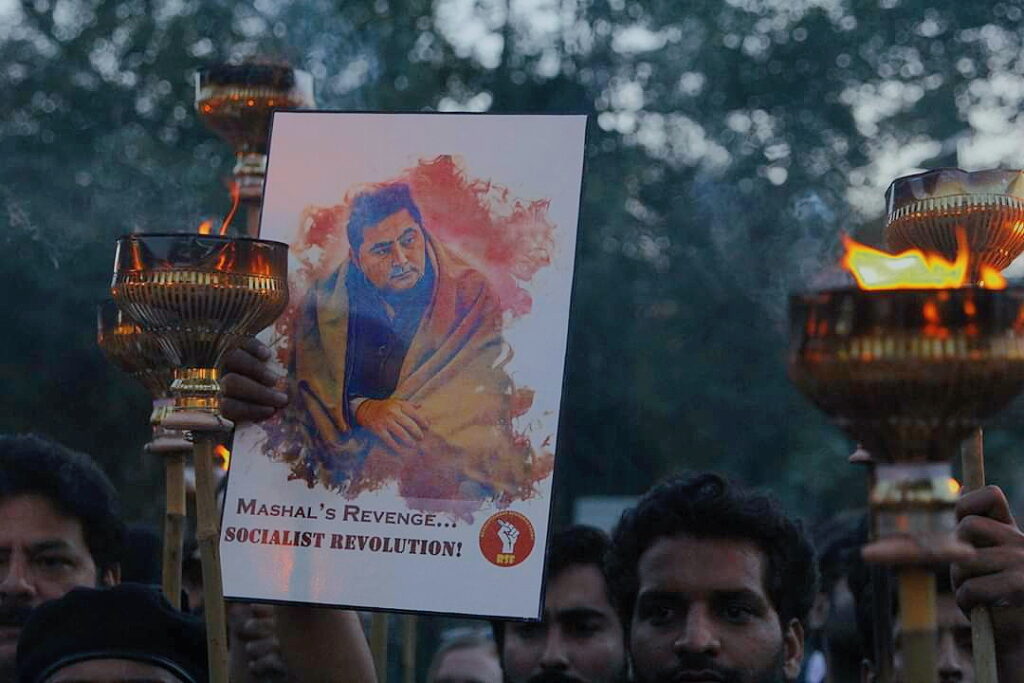Mashal Khan left his legacy of resistance within us, writes Shireen Rizvi
On April 13, 2017, Mashal Khan, a Pashtun student studying at Abdul Wali Khan University in Mardan was lynched by an angry mob on campus premises over baseless allegations and rumours. The brutal attack exposed the state of our educational institutions and also gave fresh impetus to student politics in Pakistan.
Mashal Khan’s memory and legacy has been celebrated through marches and demonstrations organised by various progressive student organizations for three years now. This year, because the lockdowns caused by the Covid-19 pandemic, Mashal March could not be organised on the streets, but his image and memory continued to dominate the discourse by students on social media.
Over past few years we have been seeing a burgeoning student movement across the country. It has not only made space for itself within contemporary politics, it has also become its vanguard. Student politics is not an alien or new concept, especially in Pakistani context. Students have been mobilising and organising since General Ayub Khan’s dictatorship. But the organisers of today’s student movement have different strategies and tactics for approaching the masses, a fact that is not well understood by many observers of this movement. Social media has played a vital role in expanding the outreach of student voices and has also enabled greater connectivity between them. French psychoanalyst Jacques Lacan writes that any existing social order cannot be challenged until it gets disrupted by an event. Mashal Khan’s murder on campus played the role of an “event” for student politics in Pakistan.
Mashal Khan’s story brings to light many issues which must be addressed, foremost because the question of violence and academic freedoms.
Violence on campuses has been a common feature of the university experience of many students since the time of General Ziaul Haq. Violence on campuses is not supposedly directive; it nurtures its roots through ideologically-driven administrations. Foucault explains: violence, under the umbrella of discipline, first normalises itself and eventually get internalised by the oppressed. In our faulty education system, the tensions between students and administrations are glaringly obvious, because these systems have been prevailing on a master-slave dichotomy which creates vast distance between students and higher authorities. This vacuum can only be filled by unions. Student unions create safe spaces for students to strategise over their demands that can improve the education system of the country.
The reason behind Mashal’s murder came to surface within a week: his progressive ideas were considered a threat by the administration and it incited students on campus to lynch one of their peers to crush the voice of dissent.
The brutal killing of Mashal Khan also highlights the intolerance we have nurtured within our society. We see this intolerance when a sedition case was lodged against Mashal Khan’s father Iqbal Lala for participating in Students Solidarity March on November 29, 2019. We see this intolerance when intellectuals and writers are arrested and kept as political prisoners.
This overflowing fanaticism has curbed the space for free speech entirely. A sense of fear prevails among students which has halted the production of new ideas and initiatives by young people.
Student experiences across Pakistan’s provinces also vary greatly. For instance, if a student from the Punjab who believes in progressive ideas tries to mobilise within campus, he/she is risking their degree, while a student who believes in the same ideas but belongs to the peripheries is risking his life there.
This is a dilemma of an unequal society which believes lives of young citizens are meaningless. Mashal Khan’s killing did not happen in a vacuum; it was the product of institutionalized violence, curbs on free speech and great intolerance. Mashal Khan was laid to rest three years ago, but he left his legacy of resistance within us. It is our time to decide whether we limit his message to an annual vigil ceremony or whether we carry forward the torch of resistance.
Students definitely hold the power to break dictatorial regimes and we will. Long live Mashal Khan. Long live the Revolution.
The Students’ Herald News Desk focuses on reporting the latest news regarding student politics and campus updates to you.
The News Desk can be reached at admin@thestudentsherald.com




